Posts Tagged ‘Burma Partnership’ (399 found)
UN Special Rapporteur Demonstrates Ongoing Grave Human Rights Violations
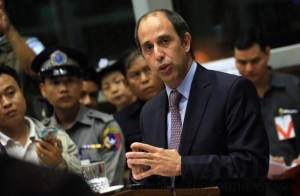 On 24 October, the Special Rapporteur on the situation of human rights in Myanmar, Tomás Ojea Quintana, presented his report to the United Nations General Assembly. The content of Quintana’s report demonstrates a continuing and, in some cases, a worsening of the human rights situation in Burma today, thus illustrating how imperative it is for the mandate of the Special Rapporteur to be continued.
On 24 October, the Special Rapporteur on the situation of human rights in Myanmar, Tomás Ojea Quintana, presented his report to the United Nations General Assembly. The content of Quintana’s report demonstrates a continuing and, in some cases, a worsening of the human rights situation in Burma today, thus illustrating how imperative it is for the mandate of the Special Rapporteur to be continued.
Of particular concern for Quintana is the situation for Muslims in Burma in the wake of a number of outbreaks of violence in the past 18 months. There are currently 140,000 displaced Rohingya living in camps in Arakan State, segregated from the rest of society. Quintana also stated that the Burma government is not doing enough to address the root causes of this violence, one of which is the institutionalized discrimination against Rohingya, denying them legal status under the 1982 Citizenship Law. Another alarming situation for Quintana are the measures brought in since the violence that have placed restrictions on access to livelihoods, education and healthcare that enforced segregation has facilitated. Furthermore, Quintana expressed deep concern over the role of the authorities themselves in instigating the violence: “Allegations of gross violations since the violence erupted last June, including by state security personnel, remains unaddressed” […]
“Cool Heads” Needed as Bombings Tear Through Burma
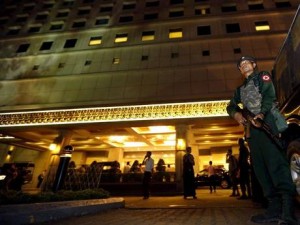 A string of bombings around Burma have rocked the country, killing three and injuring at least 10 people. Arrests were made on 18 October, with police stating that those behind these attacks were Karen businessmen trying to deter foreign investment in resource rich Karen State. Despite this, there is still much debate as to the true perpetrators and their motives.
A string of bombings around Burma have rocked the country, killing three and injuring at least 10 people. Arrests were made on 18 October, with police stating that those behind these attacks were Karen businessmen trying to deter foreign investment in resource rich Karen State. Despite this, there is still much debate as to the true perpetrators and their motives.
On 11 October, the first serious explosion occurred in Taungoo, Pegu Division, killing two. On 13 October, two bombs exploded in northern Rangoon, causing damage but injuring no one. Further explosive devices were found in restaurants in Rangoon and Mandalay on 14October which were detonated in controlled explosions by the police. Later in the same evening, a bomb exploded in a room of Rangoon’s Traders Hotel, injuring an American woman. Traders Hotel is one of the best known and upmarket hotels in the country, and is popular with both foreign and domestic tourists. On the night of 16 October and the morning of 17 October, three bombs more were detonated in Namhkam, Shan State, killing one person and injuring several more […]
Where is the Benefit for the People of Burma?
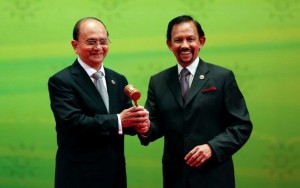 The international community’s praising of the Burma government continues amid serious problems in the country. UN Secretary General Ban Ki-moon commended Burma’s “unprecedented reform” as President Thein Sein accepted the long-awaited ASEAN helm on 10 October in Brunei, an opportunity the country’s leaders were forced to give up in 2006 because of the dire human rights situation at the time.
The international community’s praising of the Burma government continues amid serious problems in the country. UN Secretary General Ban Ki-moon commended Burma’s “unprecedented reform” as President Thein Sein accepted the long-awaited ASEAN helm on 10 October in Brunei, an opportunity the country’s leaders were forced to give up in 2006 because of the dire human rights situation at the time.
Despite the ongoing serious violations of fundamental human rights throughout Burma, ASEAN made the decision of granting Burma the chairmanship in 2011. The grouping of ASEAN itself is shaky and suffering from a big gap in the level of democratization among its member states. ASEAN is also quickly approaching its 2015 deadline for economic integration. Handing the chair in this very important time to a member state in transition can create opportunities for the region as Burma reengages with the West, but on the other hand, the decision is also risky, especially when it entails a chair who will predictably be influenced by China, at least on the matter of the disputed South China Sea […]
Fresh Violence in Arakan State Belies Government’s Disingenuous Assurances to UN Human Rights Council
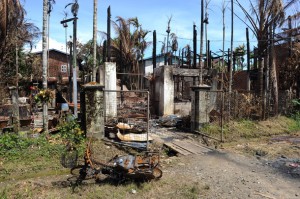 A resurgence of inter-communal violence in Arakan State on 1 and 2 October has left six Muslims dead and dozens of homes destroyed, with mobs setting fire to houses in several villages in Sandoway Township just hours before President Thein Sein was due to arrive for an official visit to the beleaguered region. Calm has now been restored, but suspicions and tension remain between Muslims and Buddhists, while nearly 500 people have been left homeless and many others reportedly injured or missing.
A resurgence of inter-communal violence in Arakan State on 1 and 2 October has left six Muslims dead and dozens of homes destroyed, with mobs setting fire to houses in several villages in Sandoway Township just hours before President Thein Sein was due to arrive for an official visit to the beleaguered region. Calm has now been restored, but suspicions and tension remain between Muslims and Buddhists, while nearly 500 people have been left homeless and many others reportedly injured or missing.
What differentiates this latest outbreak of violence from previous ones is that this time the ethnic Rohingya, who bore the brunt of the violence in June and October 2012, were not on the receiving end. Rather, according to local NLD representative Win Laing, “They are Kaman [Muslims], they are ethnic nationals—not outsiders.” Yet, despite evidence to the contrary, namely that the victims were of a different ethnicity this time and that Buddhist gangs initiated the violence, the government line is that so-called illegal Muslim immigrants – or Rohingya – are to blame for the violence. “Bengali people wanted to create violence now,” claimed Win Myaing, Arakan State government spokesperson […]
A Dangerous Precedent for Development in Burma
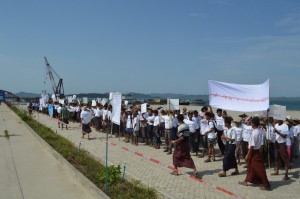 On 30 September, Shwe Gas Movement released a new report entitled, “Drawing The Line: The Case Against China’s Shwe Gas Project, For better Extractive Industries in Burma”. The report highlights the consequences, violations, unequal development, inadequate laws and the dangerous precedent set by the Shwe Gas Project. With increased investment and the liberalization of Burma’s economy, development projects similar to Shwe Gas are set to increase. If they follow a path of code and conduct similar to the Shwe Gas Project, the future of Burma will be rife with increased land confiscation, labor abuse, environmental degradation, loss of livelihoods, conflict, arrests and imprisonment of rights activists defending themselves and their communities. The benefits will be unequally distributed and negative consequences will be borne by farmers, fishermen, and by the citizens of Burma.
On 30 September, Shwe Gas Movement released a new report entitled, “Drawing The Line: The Case Against China’s Shwe Gas Project, For better Extractive Industries in Burma”. The report highlights the consequences, violations, unequal development, inadequate laws and the dangerous precedent set by the Shwe Gas Project. With increased investment and the liberalization of Burma’s economy, development projects similar to Shwe Gas are set to increase. If they follow a path of code and conduct similar to the Shwe Gas Project, the future of Burma will be rife with increased land confiscation, labor abuse, environmental degradation, loss of livelihoods, conflict, arrests and imprisonment of rights activists defending themselves and their communities. The benefits will be unequally distributed and negative consequences will be borne by farmers, fishermen, and by the citizens of Burma.
The Shwe Gas Project is the largest extractive resource project in Burma with dual gas and oil pipelines traveling almost 800km beginning in Arakan State, passing through Magway and Mandalay Regions, exiting Burma through northern Shan State and terminating in Kunming, China. The now operational project provides China with a valuable energy transportation system and is expected to earn US$54 billion for the Burma government, a government that was given the lowest resource governance ranking in the world three months ago by the Revenue Watch Institute […]
2013 ANNI Report on the Performance and Establishment of National Human Rights Institutions in Asia
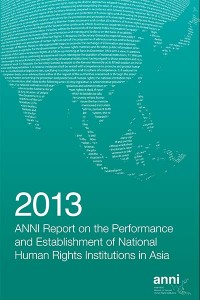 National Human Rights Institutions (NHRIs) have become increasingly prominent actors in the national, regional and international human rights arenas. When able to operate independently and effectively, they are important mechanisms that constitute an effective complement to the judiciary and other institutions in the national infrastructure tasked with the promotion and protection of human rights.
National Human Rights Institutions (NHRIs) have become increasingly prominent actors in the national, regional and international human rights arenas. When able to operate independently and effectively, they are important mechanisms that constitute an effective complement to the judiciary and other institutions in the national infrastructure tasked with the promotion and protection of human rights.
2012 (and significant events in the first half of 2013) represented a litmus test for many NHRIs in the region. There were significant events for Asian states: such as budding attempts towards democratic transition; and states that faced internal conflict or communal violence, among others. Often, this involved the complicity of state actors, which renders the fight against impunity a formidable challenge.
This report includes a chapter entitled “Lost in Transition” that looks at the Myanmar National Human Rights Commission […]
Rule By Law: An Analysis of the Use of Legislation to Stifle Civil Society Space in Burma
This paper is primarily an analysis of the raft of legislation that is in the process of being pushed through parliament to target HRDs, activists, protestors and CSOs, and the threat that such legislation poses to their fundamental rights – which Burma is legally bound to respect and protect under the 2008 Constitution. This paper will also look at the current situation of political prisoners to demonstrate how the legislation is being misused in collaboration with a compliant judiciary and the Myanmar National Human Rights Commission […]
• • •Burma: Release Ten Arakanese Activists, Amend Peaceful Assembly and Peaceful Processions Law
Targeted Prosecutions of Peaceful Protesters Continue
The government of Burma should immediately release ten Arakanese activists convicted of violating Burma’s Law on Peaceful Assembly and Peaceful Procession after protesting a Chinese-led natural gas project in western Burma, four nongovernmental organizations said today. On 26 September, the ten activists were sentenced to three months in prison for their participation in a peaceful protest against adverse impacts of the transnational gas project on 18 April on Maday Island in Burma’s western Arakan State. The Shwe Gas Movement, Burma Partnership, Human Rights Education Institute of Burma and Fortify Rights International called today for the immediate release of the activists and for the urgent amendment of the controversial law […]
• • •Civil Society Commemorates International Peace Day in Burma
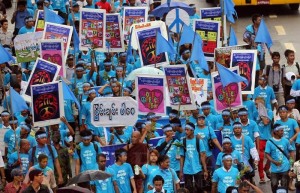 On 21 September, civil society from Burma and the region marked the International Day of Peace with many activities to highlight the urgent need for lasting peace in Burma.
On 21 September, civil society from Burma and the region marked the International Day of Peace with many activities to highlight the urgent need for lasting peace in Burma.
Civil society in Rangoon organized a large event, including many young activists who were charged under Article 18 of the Peaceful Assembly and Peaceful Procession Law and are still facing charges for marching on International Day of Peace last year. Around 300 people from 60 different civil society organizations marched through 8 townships from City Hall to the People’s Park, shouting slogans “May the Union be peaceful,” “Build national reconciliation” and “Stop war.” Though plagued by constant heavy rain, the event, unlike previous years, was held with permission of local authorities. It was also attended by high-level government officials, including government peace negotiator, Minister Aung Min, and Minister of the President’s Office, Soe Thein.
Members of civil society, after giving the opportunity for the government officials to make speeches, publicly stated their demands for peace, right in front of the ministers. They called for the immediate cessation of the Burma Army’s offensives in Kachin State, a nationwide ceasefire, and most important of all, the realization of federalism through an all-inclusive national conference, reinforcing the statement endorsed by thousands of people on the 8888 Silver Jubilee […]
New Film Calls for Political Dialogue for Lasting Peace in Burma’s Kachin State
To coincide with the International Day of Peace, Burma Partnership launched a new documentary film today entitled, “Guns, Briefcases and Inequality: The Neglected War in Kachin State.” The film demonstrates the need for the government of Burma to engage in meaningful political dialogue with all ethnic nationalities on equal terms, including discussing amendments to the 2008 Constitution. These are necessary in order to address the underlying causes of armed conflict: self-determination, the lack of ethnic rights, and inequality, and to move towards lasting peace throughout the country […]
• • •








 All posts
All posts